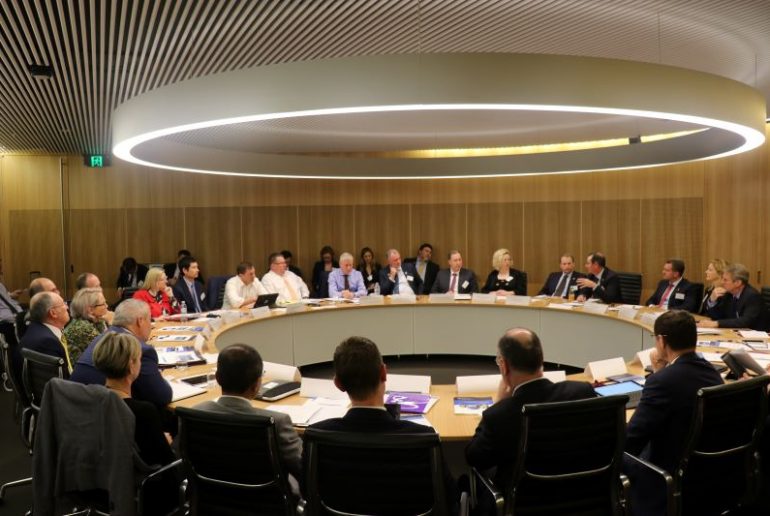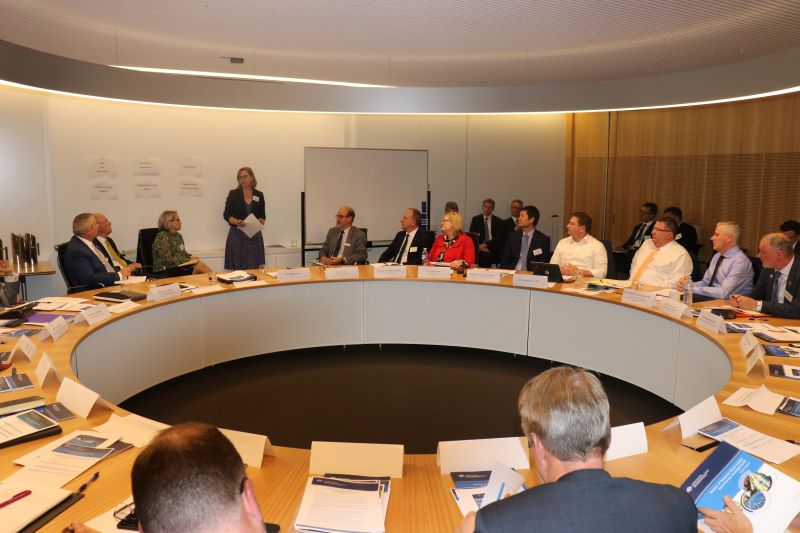National Office of Road Safety update
15 September 2019 | Government relations, Policy & planning

We Ride Australia was pleased to be invited to participate in the new federal Office of Road Safety first national stakeholder Roundtable in Sydney on the 2nd September.
Chaired by the Deputy Prime Minister, Hon. Michael McCormack, Co-Chaired by Assistant Minister for Road Safety and Freight Transport, Hon. Scott Buchholtz and Llew O’Brien MP, the national Roundtable sought the views of key research, safety and industry stakeholders on enacting a Vision Zero approach in Australia.
The new Office of Road Safety (ORS) was the first commitment of the Coalition Government arising from the recommendation delivered in the Inquiry into the National Road Safety Strategy 2011-2020, chaired by Associate Professor Jeremy Woolley, Director of the Centre for Automotive Safety Research at the University of Adelaide, and Dr John Crozier, Chair of the Royal Australasian College of Surgeons’ Trauma Committee (read more here). The subsequent Governance Review established the Office of Road Safety as the first step to addressing the Review’s recommendations.
In a letter we sent to the Office of Road Safety the on the day it commenced operating, we argued for a strong approach to addressing safety for bicycle riders as an important part of safe, convenient mobility for all Australians and we were therefore pleased to receive an invitation to participate in the first of 3 Roundtables to be conducted nationally. Our Director – National Advocacy, Stephen Hodge, attended and presented to the entire group during the session.
We have attached the ORS’s latest Communique (#4) with an update on both the recent Transport and Infrastructure Council (TIC – all Commonwealth, state & territory Ministers) meeting, which focused on road safety and Vision Zero, and the Roundtable proceedings. Below we have noted some of the key points discussed in the Roundtable.
In addition to Hon Michael McCormack, Asst Minister Buchholtz and Llew O’Brien MP, the Acting Secretary of the Department for Infrastructure, Transport, Cities and Regional Development, Head of BITRE, Gary Doleman, ORS Director, Sue Tucker and other senior officials of the department attended.
Key points:
- Deputy PM: welcome and opening comments
- Asst Minister Buchholtz: more accountability for results and better data capture needed. Also a more competitive narrative to seek funding for road safety against the very competitive demands for funding from every domain of government, the need to recognise and act on the ‘low hanging fruit’ we should target to improve road safety.
- Llew O’Brien MP: lived experience of road trauma as a Police Officer attending road accidents and as an investigator, strong bi-partisan support for a new Parliamentary Friends of Road Safety Co-Chaired with Alex Gallacher MP, terms of reference for the ORS need to be defined and will be informed by the Roundtable and better data coordination and management is needed.
- A/Secretary Pip Spence reported on the expectation that the ORS will serve as a primary advisor to Government on road safety, sees the job as a collaborative partnership, will focus on the best structures and budget measures to support the National Road Safety Strategy (NRSS), the next update of which is likely to be substantially different and the outcomes of the TIC meeting (see Communique also):
- extensive discussion on driver distraction
- governance review of the NRSS
- road safety to be a standing item on the TIC meeting agenda
- re-iterated a commitment to adoption of safe principals, builds on the land transport agreement that safe systems principals will be incorporated into all new transport projects (positive provision)
- sought stakeholders’ ideas on how KPI’s can be developed from the Review of the NRSS, and
- The next TIC meeting is in November 2019.
- BITRE Director Gary Dolman presented on the latest outcomes and road safety data in the country, fact that differences in Police vs hospital accident and trauma data, especially for bicycle riders and motorcycles, is largely due to them not reporting many admissions. A full presentation was made to the group.
- Group discussion – Data:
- Some key comments from road safety research bodies made the point that funding for roads and transport must be related to ensuring a higher level of service is built – this can be shown to directly save lives
- Many comments and agreement around speed control creating safer traffic, also drugs and distraction.
- Not all existing data sets are being effectively used for understanding road safety, quality of data still an issue.
- Group discussion – Engagement on Road Safety
- Capacity of Councils a big issue
- Lots of positive progress by corporates for road safety – Road Safety Partnership Program
- What is the model to drive engagement and progress? UN Road Safety Week, the bi-annual community attitudes to road safety survey – can that be tweaked?
- Group discussion – funding and transformation
- Allocate money in response to infrastructure metrics for major roads, the Government could be more directive around requirements for safe systems.
- 33 KPIs exist in the NRSS, link financial incentives to safety outcomes on the road
- transparency needed in establishing this system, safety key concern expressed by all Australian Automobile Association members (NRMA, RACV etc.)
- Group discussion – contribution by We Ride Australia
- we outlined our engagement in cycling to school with current Commonwealth-funded pilot under way (30% of morning peak traffic is children being driven to school, therefore responses that boost active travel to school can have a significant impact on congestion, safety and performance for the entire system, especially as population booms and school enrollment increases strain capacity in all parts of the system)
- we discussed initiatives we are looking at such as a better approach to design of bicycle infrastructure with the adoption of a more innovative approach to design (one of the reasons we have just attended the annual congress of the North American City Transport Officials group (NACTO), who have produced an acclaimed series of bikeways and city streets design guides). Why not an Australian version?
We Ride Australia’s vital work to build a consensus around how can make cycling safer and generally ‘do bikes better’ continues this coming week with our annual Transport Leaders Study Tour, where will host Australian leaders for visits to Vancouver, Portland and San Francisco to look at North American progress on bicycle planning, transport and design. See more on our Study Tour here.
We look forward to updating our members and friends on progress for Road Safety as it unfolds.
COMMUNIQUE 4 FROM THE OFFICE OF ROAD SAFETY
The team at We Ride!

